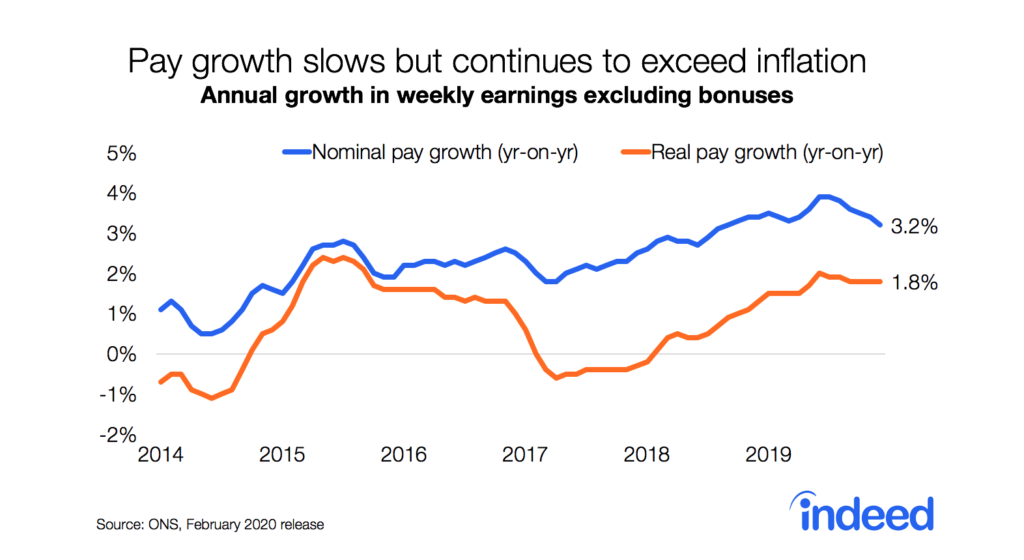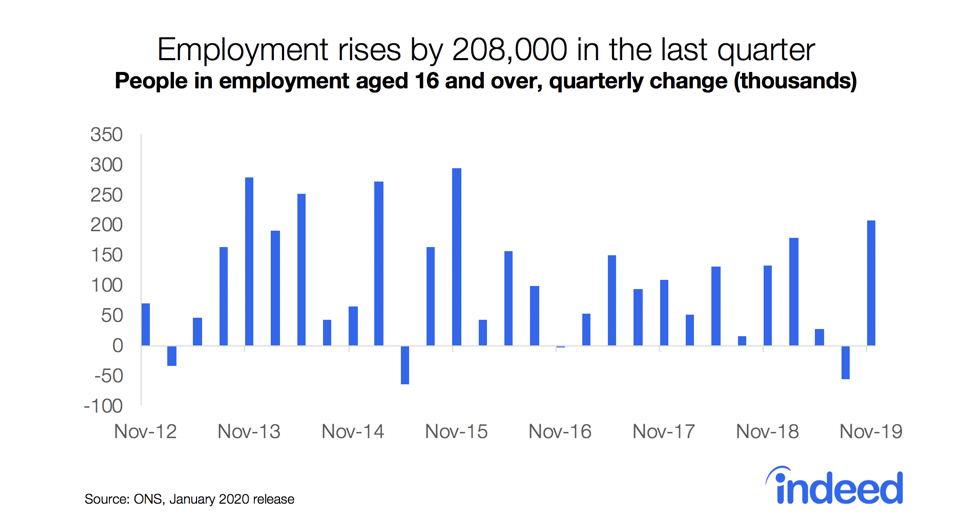Brexit creates an opportunity for UK policymakers to redefine the immigration system to meet the economy’s needs. Recent announcements suggest that the government’s post-Brexit policy goal is to prioritise high-skilled migration and give equal treatment to EU and non-EU workers.
Using Indeed data on global job search patterns, we asked how such a policy might affect the supply of workers British businesses rely on. Which jobs are foreign jobseekers most attracted to compared with jobseekers based in the UK? Are EU and non-EU jobseekers interested in similar roles? And if work visas were restricted to jobs that pay £30,000 a year or more, as is the case for most non-EU applicants today, then to what extent might that limit the inflow of skilled Europeans?
We found that many of the most popular jobs among non-EU jobseekers are highly paid roles in tech, research and finance. While tech roles are popular among EU jobseekers as well, Europeans are also strongly interested in other positions that require a high level of education and skill, but pay below-average salaries. These include language teaching, international sales and translator jobs, and business internships. Such roles may become harder for employers to fill if minimum salary requirements start to apply to everyone after the Brexit transition period. Employers in other sectors such as construction or healthcare, which already rely heavily on EU workers, may face similar challenges.
How might a focus on high-skilled migration affect jobseekers from other countries?
To measure the popularity of specific jobs among jobseekers in different locations, we calculated an ‘EU-to-UK click ratio’ and a ‘Non-EU-to-UK click ratio’. For example, if the EU-to-UK click ratio for a given job title is 10, then a jobseeker located in the EU is ten times more likely to click on that job than someone based in the UK. We then looked at the average posted salary for each position.
We begin with jobseekers located outside the EU. From January to September 2018, four of the 10 most popular roles for non-EU jobseekers involved working with technology, including such tools as iOS, Android and Java. Other tech job titles in the top 20 were senior software engineer, machine learning engineer, Python developer and PHP developer. Pay in all these positions is well above the average salary of £31,114 posted in job descriptions on Indeed in September 2018. This probably reflects the fact that non-EU nationals coming from countries such as India and the US currently have to meet minimum salary requirements when applying for a work visa.
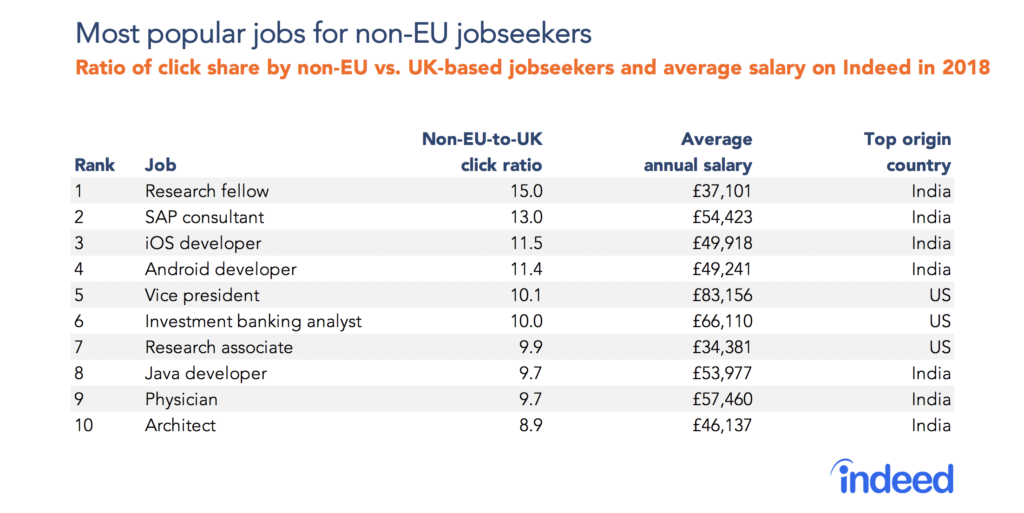
Tech roles were also among the most popular job titles for EU jobseekers. Android and C++ developers made the top 10, with other roles like machine learning engineer, Java developer and junior front end developer featured in the top 20. Several roles that require language skills were much more popular among Europeans than among UK-based jobseekers, unsurprising given the decline in language learning in British schools and universities.
Europeans were also highly interested in internships in various fields, suggesting that they view the UK as an attractive place to develop their skills and climb the career ladder. France is the top origin of internship clicks, perhaps reflecting tough labour market conditions for young people there, as well as the fact that internships are often a required part of French degrees.
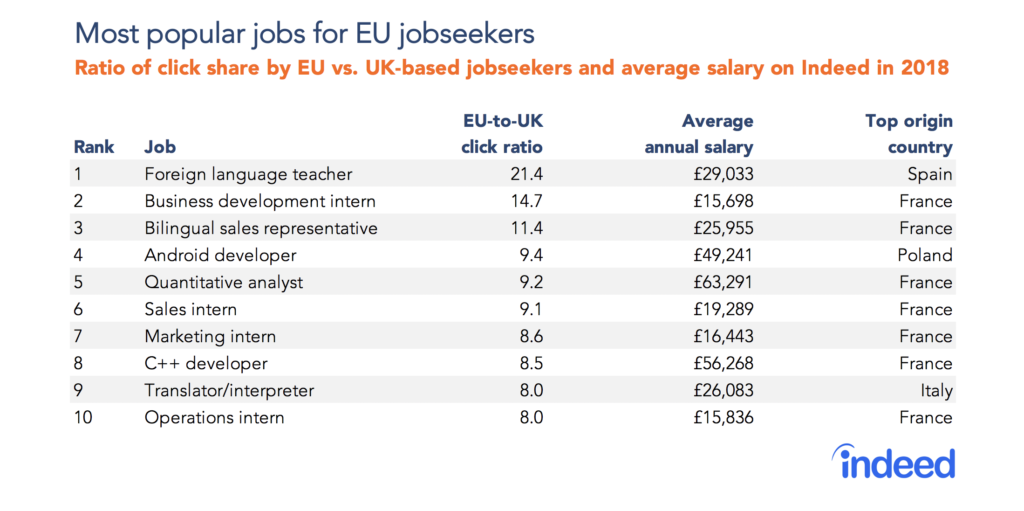
The prominence of language roles and internships sets jobseekers from the EU apart from those from outside the EU. Notably, those roles pay less, on average, than the current minimum salary required for an experienced worker to get a UK work visa. Hence, if current visa rules start applying to EU citizens after the Brexit transition period, they may constrain the supply of foreign workers for those high-skilled, but not-so-well-paid, roles. One possibility is that this may force employers to raise salaries for those jobs, which would also benefit British jobseekers. Otherwise, Brexit could reduce the supply of workers with the language skills required to facilitate trade with Europe and the rest of the world.
Interest in tech jobs remains strong
Since foreign jobseekers appear to be particularly attracted to certain tech roles, we also looked at their overall contribution to tech-related activity on Indeed. Since 2015, jobseekers based in other countries have typically accounted for between 8% and 10% of clicks on UK tech jobs. EU and non-EU jobseekers contribute to similar degrees, and the interest of both groups is alive and well. European enthusiasm for tech certainly appears to have been much less affected by Brexit to date than other sectors highlighted in earlier research.
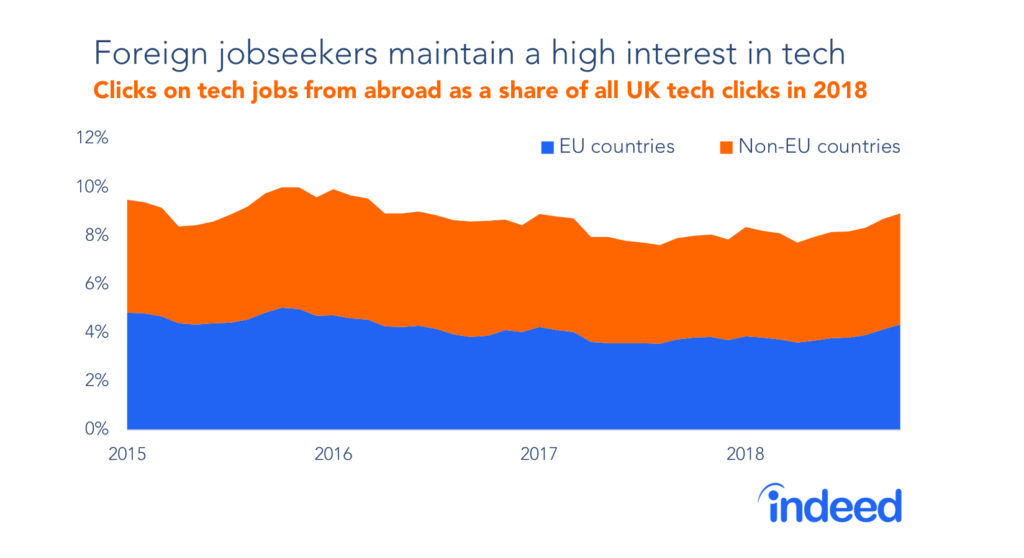
In the first nine months of 2018, the top sources of clicks on UK tech jobs were India, the US and France, followed by Poland and Ireland. As a group, Indian jobseekers are highly focused on tech in their job searches: almost one-fifth of all clicks on UK jobs from India related to tech roles.
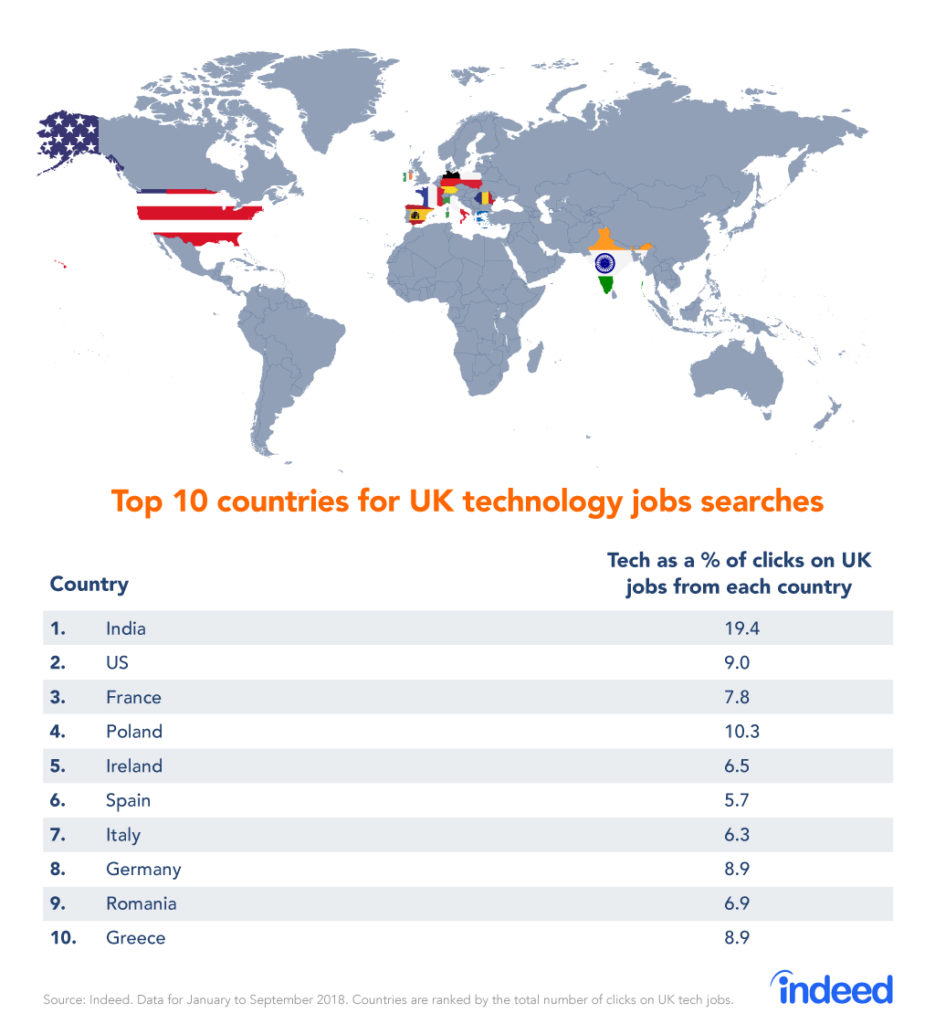
Overall, many jobs that involve technology, finance and language skills are popular with foreign jobseekers compared with UK-based jobseekers. This suggests that Britain has the potential to keep its position as a global tech and banking magnet in a post-Brexit world, provided that migration policy is sufficiently flexible to accommodate an internationally mobile workforce.
Methodology
To find the most popular jobs for foreign jobseekers, we examined the click behaviour of Indeed users between January and September 2018. To generate the ‘EU-to-UK click ratio’, we calculated two metrics for each job title: the share of clicks on that job among jobseekers whose IP address is in a country that is part of the European Union’s freedom of movement area (see below) and the share of clicks by all users located in the UK. We then took the ratio of the two metrics and followed a similar process for the ‘Non-EU-to-UK click ratio’. Jobs with a ratio greater than 1 are positions which foreign users are disproportionately clicking on compared with domestic users. We calculated average salaries using job postings on Indeed.co.uk over the same period. Tech jobs were defined using the Standard Occupational Classification system.
We use ‘EU’ and ‘Europe’ as shorthand for all countries whose citizens benefit from the European Union’s freedom of movement rules and therefore have the right to move to the UK for work. This includes Switzerland and countries in the European Economic Area that are not part of the EU, such as Norway, Iceland and Liechtenstein. We classify all other countries as ‘non-EU’.




